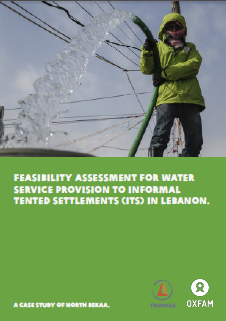Feasibility Assessment for Water Service Provision to Informal Tented Settlements (ITS) in Lebanon
 |
A case study of north Bekaa
rapport Oct 2017 ; 131 pages
Aut. Karim Eid-Sabbagh & Nizar Ghanem & Sami Halabi
Ed. Oxfam - Beirut OXFAM UK - Oxford Triangle - Beirut
Téléchargeable sous format: PdF
Résumé:
Cette étude documente les causes et impacts socio-économique et politique de l’approvisionnement en eau des citoyens libanais et de réfugiés syriens. Cette étude de cas porte sur neuf villages du Nord de la Bekaa.
Cette recherche déconstruit les obstacles à une offre de services plus durables, à savoir l’extension de réseaux publics aux camps informels, en se concentrant sur la faisabilité financière, sociale et juridique.
A la lumière des résultats de l’étude, une approche multi-niveaux de la gouvernance est suggérée afin de pouvoir approvisionner en eau l’ensemble des communautés. Cela permettrait la mise en œuvre d’une approche gagnant-gagnant. Les agences humanitaires remplirait leur engagement à fournir une assistance proportionnelle aux communautés libanaises vulnérables et aux réfugiés syriens, tout en soutenant les institutions gouvernementales libanaises, à savoir les Municipalités, les Etablissements des Eaux. Ces acteurs sont partie intégrante du plan de réponse national à la crise des réfugiés, le LCRP (Lebanon Crisis Response Plan).
L'étude est la première en son genre à modéliser l'offre, la consommation et le consentement à payer par une approche mixte qui englobe les aspects sociaux, politiques et économiques de l'approvisionnement en eau municipal dans ces neuf villages.
Abstract:
This study builds an evidence base on the socio-economic and political causes and impacts of
current water supply to both Lebanese citizens and ITS Syrian refugees, taking nine villages in North Bekaa as a case study area. The research is employed to unpack the obstacles to providing more sustainable solutions, namely extending piped public water to ITSs, focusing on the financial, social and legal feasibility requirements. In light of the study findings, a multi-level governance approach is recommended to address water supply to all concerned communities. With this, a Win-Win can be achieved. Humanitarian agencies would fulfil their commitment to providing proportional assistance to vulnerable Lebanese communities along with Syrian refugees, while supporting Lebanese governmental institutions, namely municipalities and RWEs, both of which are the integral to the country’s refugee response plan, the joint United Nations-Government of Lebanon Crisis Response Plan (LCRP).
The study is the first of its kind to model supply, consumption and willingness-to-pay through a mixed-methods approach which encompasses social, political and economic aspects of municipal water provision in these nine villages
Public-Cible:
Mots clefs: |
accès à l'eau (CI) (DT) (OP) (ope) , aspects institutionnels (CI) (DT) (OP) (ope) , humanitaire, urgentiste (CI) (DT) (OP) (ope) |
Pays concerné: |
Editeurs/Diffuseurs: |
|
Oxfam - Beirut - Liban |
OXFAM UK
-
OXFAM United Kingdom & Ireland - Oxford - Royaume Uni |
Triangle - Beirut - Liban |
En cas de lien brisé, nous le mentionner à communication@pseau.org